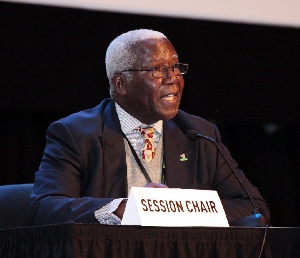 Professor Alfred Apau Oteng-Yeboah
Professor Alfred Apau Oteng-Yeboah
A retired Professor, Department of Plant and Environmental Biology, University of Ghana, Legon, Professor Alfred Apau Oteng-Yeboah, has expressed concern about the fact Atewa, a globally significant biodiversity area with multiple benefits and great potential for ecotourism, is one of the natural forests planned to be exploited in exchange for the US$2.0 billion Chinese money acquired for infrastructural development across the country.
Although he has no problem with infrastructure for national development as suggested by government as the purpose of the money, he has a problem with the inclusion of Atewa in this deal.
Prof. Oteng-Yeboah in an elaborate article on the subject matter views Atewa as sacred and a total embodiment of the soul and spirit of the Akyem Abuakwa people which should be protected.
“Why should a precious, unique and priceless site such as Atewa be destroyed; and who will account for the water and the endemic animals and plants, many of which were yet to be scientifically discovered and named?”
“Who will follow the removal of rocks which predate our current age, mark and study them to provide an account of their history? Who will supervise the removal and haulage of the excavated soil of the mountain and make sure that it is only bauxite deposits that are being removed but not diamonds and gold? Who will account for and who will authenticate the value of the excavated soils?” he asked.
Prof. Oteng-Yeboah, who’s a former Chair of the Subsidiary Body on Science, Technical and Technology Advice to the UN Convention on Biological Diversity (CBD), noted that “there were many questions to ask whose answers may never be found and that he was aware of work done on the ecosystem valuation of the Atewa in terms of its contribution to human wellbeing which far outstrips any destructive and unsustainable economic endeavour that would involve the removal of the mountain.”
This he said was where the Precautionary Principle enshrined in Agenda 21, which is the forerunner of the current global Agenda 2030 and the AU 2063 should be invoked.
He said what the Ghanaian should know was that once the forest is exploited; the contributions that this natural resource provides to the people of Akyem Abuakwa and Ghana at large will be lost forever.
The Retired Professor said Ghanaians should be made to know that, no jobs will be created with the mining exploitation and that there is nothing like scientific mining anywhere without destruction, as quoted falsely by some government officials.
He said studies by colleagues in the Birim, Densu, and Ayensu basins in the Eastern and Central Regions respectively, indicate extensive land degradation, pollution and silting of rivers and streams which have exacerbated extreme poverty for the local people who subsist on peasant farming because of changes in the landscapes.
Prof. Oteng-Yeboah, who is also the former Chair of the Subsidiary Body on Science, Technical and Technology Advice to the United Nations Convention said the climate buffer, which the Akyem Abuakwa people have enjoyed over the years, with the presence of the Atewa mountain contributing to climate regulation, was now under threat.
He said the scenarios point to a bleak future where a place that was once a prosperous production of socio-ecological landscape was now being turned into a zero-production area.
Prof. Oteng-Yeboah appealed to President Nana Addo Dankwa Akufo-Addo and his cabinet, many of whom he said comes from the area, to reconsider Atewa’s future and remove it from the list for exploitation.
He believes that his appeal, which is based on scenario predictions, will receive urgent attention, adding, “I foresee, in two to three decades time when our present generation would have left the scene, and the new generation has taken over, these places will be in total desolation.”
“It will not be easy for them to survive. We would have failed in living to the tenets of sustainable development, whose beginnings were vigorously promoted by Nana Sir Ofori Atta I, the Okyenhene, in many of his writings and speeches to the citizens of this country”.
More about Prof. Oteng-Yeboah
Prof. Oteng-Yeboah is also a recipient of the global MIDORI Prize for Biodiversity in 2014. He was part of a group that initiated the IPBES (Intergovernmental science-policy Platform for Biodiversity and Ecosystem services).
He is the Chair of Ghana National Biodiversity Committee
He is a former member of Council for GEF representing Coastal West African States, a former Chair of the Standing Committee for UNEP Convention on Migratory Species, and also a previous Vice Chair of the Standing Committee of CITES.